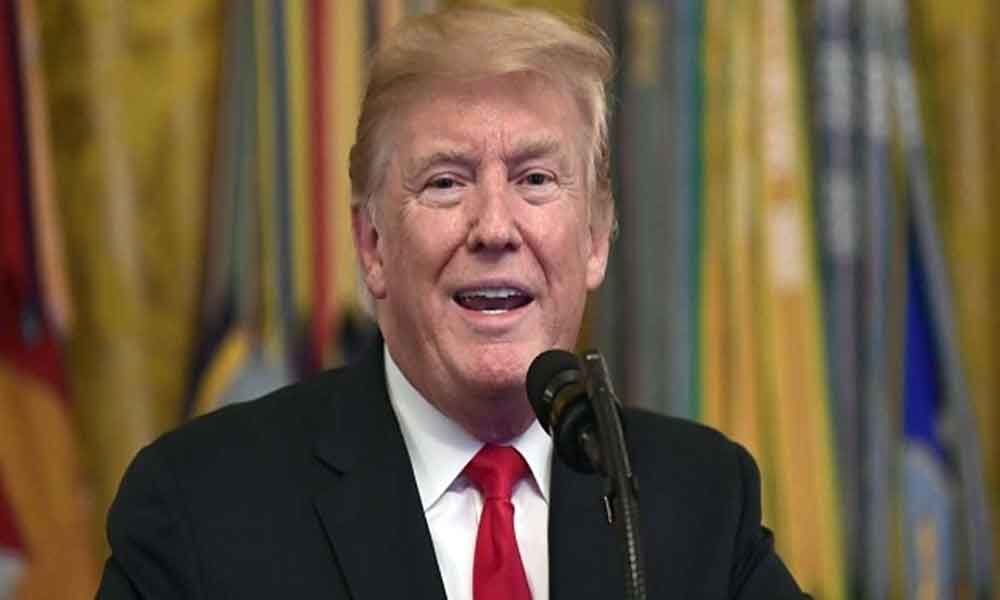Trump proposes 'merit-based' immigration system

US President Donald Trump has proposed a sweeping change to the immigration system to make it "merit-based" favouring professionals and well-educated people who will be high earners.
New York:US President Donald Trump has proposed a sweeping change to the immigration system to make it "merit-based" favouring professionals and well-educated people who will be high earners.
Unveiling his plan at the White House on Thursday, he said the current immigration system discriminates against "genius" and "brilliance" and that he wanted to correct this with a new system he called "Build America Visa" that favours those with demonstrated potential.
The plan is modelled on the immigration systems of Canada, Australia and New Zealand, which prioritise admission based on points awarded for various qualifications.
It will preserve the immigration of spouses and children of permanent residents or Green Card-holders, but eliminate preferences for other relatives like siblings and parents.
"We prioritise the immediate family of new Americans - spouses and children", Trump said. "The loved ones you choose to build a life with, we prioritise... They go right to the front of the line".
Trump said he wants to increase the current allocation of 12 per cent of Green Cards for highly skilled professionals to 57 percent at the expense of certain categories of relatives and people immigrating from certain countries based on a lottery system. This would reverse the current system of reserving about 60 per cent of Green Cards for relatives. About 1.13 million people get permanent resident visas or Green Cards every year.
Making his case for the merit system, he said that companies were moving offices abroad because the current system prevented them from retaining highly skilled and even "totally brilliant people".
The emphasis on merit has the potential to help Indian professionals who have to wait for ten years or more to get a Green Card -- but only if the national quotas is lifted. Currently each country's quota is about 25,000 regardless of its population size.
It is not clear if that would happen because Trump did not say if the national limits would be removed or modified.
Some members of both houses of Congress, including presidential aspirant Senator Kamala Harris, have introduced legislation, Fairness for High-Skilled Immigrants Act, to remove the national quota limits for professionals.
Trump was also silent on the H1-B visas that are given temporarily to skilled professionals. His administration has sought to make the qualifying standards more stringent and has raised the rejection rate for the visa making it an area of contention between India and the US.
Trump's plan will also give preference to those who have been educated in the US.
Packaged in Trump's plan crafted by his son-in-law Jared Kushner and a controversial adviser, Stephen Miller, are proposals for tough new measures against illegal immigrants and for strengthening border security by building a wall and tightening asylum requirements. These will be opposed by Democrats.
However, the ambitious plan that essentially restates many of his previous proposals is unlikely to get past Congress.
"Trump's proposal has no chance of becoming law in this Congress," said Doug Rand, who worked on immigration policy at the White House during Barack Obama's presidency and is the co-founder of Boundless Immigration, a company provides help with navigating the system.
Trump himself admitted as much, pinning his hopes on his re-election. If it did not pass in his current term it would "be passed after the election, when Republicans take back the House, hold the Senate and keep the presidency", he claimed.
"This is classic election talk and is designed to cater to the President Trump's voter base" said Vivek Tandon, the CEO of EB5 BRICS, an immigration advisory firm. "I don't believe this to be meaningful proposal".
Democratic Party leaders voiced their strong opposition to the Trump plan even before it was formally unveiled.
Speaker Nancy Pelosi decried the use of the word "merit", telling reporters: "It is really a condescending word."
Democratic Party leader in the Senate, Chuck Schumer, denounced it as "anti-immigration reform".
"It repackages the same partisan, radical, anti-immigrant policies that the administration has pushed for the two years," he said.
Trump hit back at the Democrats accusing them of favouring open borders and lowering wages.
But a leading senator of his own party Lindsey Graham, who chairs the Judiciary Committee, also expressed doubts about the plans viability to become law.
The Trump plan's biggest weakness in getting Democratic Party support is the failure to grant permanent immigration status to those who came to the US illegally as children and are referred to as "Dreamers" for their pursuit of the American dram.
Obama had granted them temporary protection against deportation, but Trump has tried to revoke it, while saying at the same time that he wants it to be made permanent without making a concrete proposal. Democrats insist that any immigration effort should start with "Dreamers".
The "merit-based" reform of awarding points proposed by Trump would favour younger immigrants, those with higher educational qualifications, English language proficiency, job offers with h better wages, and entrepreneurs capable of creating jobs.
The preference for entrepreneurs "is good news for potential investors" according to Lawrence Chang, the president, Maryland Center for Foreign Investment.
David Finkelstein, the CEO of American Immigration Group, said that Trump's proposal for increasing the number of skilled immigrants is in line with the EB5 programme, which provides Green Cards for investors.
He added that it "has attracted high net worth families that are highly educated which is exactly what President Trump is supporting, rather than those that are not educated and require continued financial support from our social system".









